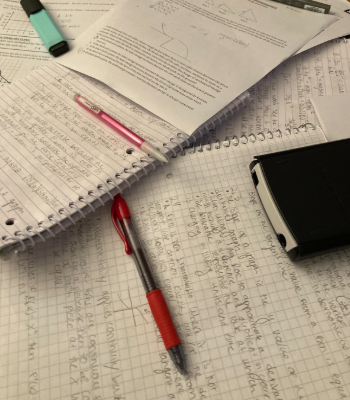With exams coming to a close, most students are stressing over their finals grades and what that means for their semester grades. Currently, West Bloomfield High School faces a divide on the subject of midterms: some teachers choose to give cumulative finals while others go the non-cumulative route; still others choose to give non-cumulative exams to some classes they teach—often the more advanced ones—and cumulative to others. Many staff members have strong opinions on the degree to which exams help students as well as what type of exam should be given. There is even further controversy over how these tests should be scheduled. Some members of the WBHS community are calling for midterms to be shifted to before winter break while others prefer the current setup. Surely there must be one approach that helps students more than others.
There hasn’t been a whole lot of research on the cumulative v.s. non-cumulative midterm debate, but a few studies have looked into this idea and what is the best for students’ learning. In one study by Elizabeth Bailey, Rebeka Greenall, Madeleine Tullis, and Kurt Williams found on the National Library of Medicine’s website, biology students were split into two groups; one group was given seven non-cumulative tests and the other was given seven cumulative tests. The groups were then given the same cumulative final exam, but neither group performed better than the other on it. After five months the students were all given a retention exam. Curiously, students that started the course with low reasoning skills and took cumulative tests throughout scored higher on the retention exam, but so did students who started the course with high reasoning skills and took non-cumulative tests throughout. It seems that cumulative exams may not be worth all the hype after all. Columbus State University’s newspaper stated, “a study conducted by Ryan and Nykamp on U.S. pharmacy schools admitted that the cost-benefit analysis of cumulative exams is unclear.” That being said, the same paper also explained that a study by Maya Khanna, Amy Badura-Brack, and Laura Finken found that cumulative tests significantly increased students’ memory retention of the content. The benefits and drawbacks of cumulative exams as opposed to non-cumulative may be best evaluated on a case by case basis with no truly “better” option.

WBHS teachers all have their own way of deciding what’s best for their classes, so maybe one of them has cracked the code on the most effective midterm structure. Mr. Kremer of the history department explained that though he is giving a cumulative final exam, he doesn’t “like an overreliance on tests as the primary metric of learning.” That’s why he structures his exams to be “more surface level review” focused on “big ideas and skills.” He understands that midterms are often a source of burnout for the students so he allows them to use their study guide and this year he decided that only people with less than an 85% for the semester need to take the midterm.
On the other hand, Mr. Hamilton of the math department does not give his students cumulative midterm exams. He explained, for “the APs, you have a cumulative final—that’s the AP exam, so why do I have to do it?” He did state his belief that students need to experience cumulative exams at some point, but held firm to his assertion that AP exams count just fine for cumulative tests. It is also important to consider that the general nature of math is that it builds off of itself, so every test in that subject will be somewhat cumulative. Another subject where this is particularly noticeable is foreign language. Mrs. Bye of the Spanish department said that due to the nature of the subject it would be pretty impossible to make a test that wasn’t technically cumulative.
Based on the teachers’ responses, it’s quite clear that the structure of midterms depends heavily on the structure of the class, including the subject, the level (regular, honors, AP, etc.), and the timing of the school year. Each of the teachers had their own specific strategies to make sure the students succeed like giving them more materials for a cumulative test or waiving the cumulative test for AP classes. The teachers know their students and subjects best, so it’s important to trust them and their testing styles.

Having dealt with the issue of cumulative and non-cumulative tests, the other issue of midterms is whether they should be scheduled before or after break. Some teachers believe that the current schedule gives students a nice brain break to prepare for finals while others think it inhibits students from fully enjoying the break and keeps them from doing their best on finals week.
Mrs. Hrycaj of the science department is a staunch opponent of having midterms after winter break. She asserted that the idea of administering a cumulative exam is simply unfair to students just coming back from a two-week break. Mrs. Hrycaj explained, “what should change is that we take exams before we leave for Christmas break; we should look at more of a college semester schedule.” Many students are likely to agree with her as cramming for exams after two weeks of forgetting all of the content is often a difficult task.
In opposition to a change in the schedule is Mr. Kisse of the English department. He expounded on this idea, stating, “I actually like it post winter break… I think it does mean that people in general do better on the exams.” He particularly values having a nice long brain break after which all students need to focus on is review. It is well-known that shorter study breaks often allow students to prepare for tests more effectively, so it isn’t a huge stretch to apply this logic to a longer break, but the question remains as to how much of the forgotten knowledge students can earn back in a week.
It’s hard to say what the best approach is, but this may also come down to a class by class basis. In classes where the main focus is conceptual understanding rather than a lot of little facts, it’s easier to see that a longer break may be helpful, but for those memorization-heavy classes a longer break may be a bit more problematic.
In preparing for midterm exams, remember to trust that your teachers have your best interest at heart and will most often be more than willing to provide you with the resources necessary for success on midterms. If you tend to be someone who struggles with going into midterms right after break, it might be best to start studying prior to break and if possible a little bit during the two weeks off as well. If you want to go the extra mile, you could even petition the school board to change the schedule!












